
لماذا لا يستطيع الذكاء الاصطناعي أن يعوض التفكير النقدي والمهارات اللينة؟
لقد غير الذكاء الاصطناعي (AI) العديد من جوانب المجتمع، بدءًا من أتمتة المهام وصولًا إلى تعزيز عمليات اتخاذ القرار. إن دمج الذكاء الاصطناعي في التعليم يحمل إمكانات كبيرة، خاصة في مجالات مثل التعلم المخصص، والتعليم القائم على البيانات، والدعم الإداري. ومع ذلك، على الرغم من أن الذكاء الاصطناعي يمكن أن يوفر الدعم والكفاءة في البيئات التعليمية، إلا أنه لا يمكن أن يعوض بالكامل عن تطوير التفكير النقدي والمهارات الشخصية - وكلاهما ضروري لإعداد الطلاب لمواجهة التحديات الاجتماعية والأخلاقية والمهنية المعقدة في العالم الحقيقي. في هذا المقال، سنستكشف لماذا تظل هذه القدرات البشرية لا يمكن الاستغناء عنها ولماذا يجب على المدارس الاستمرار في إعطاء الأولوية لتطويرها على الرغم من تقدم الذكاء الاصطناعي.
طبيعة التفكير النقدي والمهارات اللينة الشخصية
التفكير النقدي هو عملية معرفية تتضمن تحليل المعلومات وتقييمها وتركيبها للوصول إلى أحكام مبررة وحل المشكلات المعقدة. يتطلب الأمر من الأفراد التساؤل عن الافتراضات، والنظر في وجهات نظر متعددة، وتطبيق المنطق والاستدلال في المواقف التي قد لا تكون فيها الإجابة الصحيحة واضحة. التفكير النقدي ضروري بشكل خاص في المواقف التي تتضمن الغموض أو المعلومات المتضاربة، حيث يمكن الأفراد من تمييز المعرفة الموثوقة واتخاذ قرارات مستنيرة.
من ناحية أخرى، تشمل المهارات الشخصية القدرات بين الأشخاص مثل التواصل، والتعاطف، والتعاون، والتكيف، والذكاء العاطفي. غالبًا ما تعتبر هذه المهارات "مهارات حياتية" لأنها تسهل التفاعل الفعال، والعمل الجماعي، والنمو الشخصي. وهي حاسمة في البيئات المهنية والاجتماعية التي يكون فيها التعامل مع الآخرين وإدارة العلاقات ضروريًا لتحقيق النجاح.
كلا التفكير النقدي والمهارات الشخصية هما قدرات إنسانية متجذرة في التجربة والتفكير والتفاعل الاجتماعي. لا يمكن اختزالها ببساطة إلى عمليات خوارزمية أو أنماط قابلة للتنبؤ، مما يجعل من الصعب على الذكاء الاصطناعي تكرارها أو استبدالها.
حدود الذكاء الاصطناعي
لا يمكن إنكار أن الذكاء الاصطناعي قوي في أداء مهام محددة - خاصة تلك التي تتطلب معالجة كميات كبيرة من البيانات، والتعرف على الأنماط، وتنفيذ الوظائف المتكررة. يمكن للأدوات التعليمية المدفوعة بالذكاء الاصطناعي، على سبيل المثال، أن تساعد في توفير تجارب تعليمية مخصصة، وتقديم ملاحظات فورية للطلاب، وحتى تقييم الواجبات بكفاءة مذهلة. ومع ذلك، يفتقر الذكاء الاصطناعي إلى القدرات المعرفية والعاطفية اللازمة للتفكير من المستوى العالي والتفاعل الإنساني الهادف.
التفكير النقدي كوظيفة إنسانية: تم تصميم خوارزميات الذكاء الاصطناعي للعمل مع البيانات الحالية، مما يعني أنها تعتمد على الأنماط الراسخة والمعلومات التاريخية لاتخاذ القرارات. بينما يتطلب التفكير النقدي من الأفراد تجاوز المعرفة الحالية والتعامل بإبداع مع المشكلات الجديدة وغير المألوفة. يتضمن ذلك التعرف على الفروق الدقيقة، والتنقل عبر الغموض، والتعامل مع المعضلات الأخلاقية - وهي مهام ذات طبيعة ذاتية وسياقية. بينما يمكن للذكاء الاصطناعي محاكاة بعض جوانب حل المشكلات من خلال التعلم الآلي، إلا أنه لا يستطيع توليد رؤى جديدة بشكل مستقل، أو التساؤل حول الافتراضات الأساسية، أو التعامل مع عدم اليقين الأخلاقي.
المهارات الشخصية تتطلب التعاطف والاتصال الإنساني: المهارات الشخصية هي بطبيعتها علاقية وعاطفية. قد يكون الذكاء الاصطناعي قادرًا على محاكاة المحادثة، والتعرف على الإشارات العاطفية الأساسية، وحتى تقليد التعاطف إلى حد ما، ولكنه لا يستطيع فهم أو الشعور بالعواطف حقًا. التعاطف الحقيقي يتطلب فهمًا دقيقًا للحالة العاطفية لشخص آخر، والذي يتشكل من خلال التجارب الحياتية والسياق الاجتماعي والوعي الثقافي - وهي مجالات يفتقر فيها الذكاء الاصطناعي بشكل أساسي.
الإبداع واتخاذ القرارات الأخلاقية: العديد من الأهداف التعليمية تركز على تعزيز الإبداع والمسؤولية الأخلاقية. الإبداع يتضمن التفكير التباعدي، والابتكار، والتخيل - قدرات يصعب برمجتها في أنظمة الذكاء الاصطناعي. بالمثل، يتضمن اتخاذ القرارات الأخلاقية القيم، والتعاطف، وفهم العواقب المحتملة لأفعال المرء. في حين يمكن للذكاء الاصطناعي المساعدة في التفكير الأخلاقي من خلال تحليل الخيارات المختلفة، إلا أنه لا يمكنه فهم أو تقييم الأهمية الأخلاقية لهذه الخيارات بالكامل.
دور المدارس في تنمية التفكير النقدي والمهارات الشخصية
الهدف الأساسي للتعليم ليس فقط نقل المعرفة، ولكن تنمية أفراد متكاملين يمكنهم التفكير النقدي، والتكيف مع التغيير، والعمل بفعالية مع الآخرين. هذه الصفات أساسية ليس فقط للنجاح في مكان العمل، ولكن أيضًا للمواطنة المسؤولة في مجتمع ديمقراطي. تعد المدارس بيئات فريدة حيث يمكن للطلاب الانخراط في حوارات ذات معنى، واستكشاف وجهات نظر مختلفة، وتنمية الشعور بالتعاطف والمسؤولية الاجتماعية.
?Why Artificial Intelligence Cannot Compensate for Critical Thinking and Soft Skills in Education
Artificial Intelligence (AI) has transformed many aspects of society, from automating tasks to enhancing decision-making processes. Its integration into education holds great potential, especially in areas like personalized learning, data-driven instruction, and administrative support. However, while AI can provide support and efficiency in educational environments, it cannot fully replace or compensate for the development of critical thinking and soft skills—both of which are essential for preparing students to navigate complex social, ethical, and professional challenges in the real world. In this essay, we will explore why critical thinking and soft skills remain irreplaceable human capacities and why schools must continue to prioritize their development despite AI’s advancements.
The Nature of Critical Thinking and Soft Skills
Critical thinking is a cognitive process that involves analyzing, evaluating, and synthesizing information to make reasoned judgments and solve complex problems. It requires individuals to question assumptions, consider multiple perspectives, and apply logic and reasoning in situations where the correct answer is not readily apparent. Critical thinking is particularly vital in situations that involve ambiguity or conflicting information, as it enables individuals to discern reliable knowledge and make informed decisions.
Soft skills, on the other hand, include interpersonal abilities such as communication, empathy, collaboration, adaptability, and emotional intelligence. These skills are often regarded as “people skills” or “life skills” because they facilitate effective interaction, teamwork, and personal growth. They are crucial in professional and social environments where working with others and managing relationships is essential for success.
Both critical thinking and soft skills are deeply human capacities rooted in experience, reflection, and social interaction. They cannot simply be reduced to algorithmic processes or predictable patterns, making them difficult for AI to replicate or replace.
The Limits of Artificial Intelligence
AI is undeniably powerful in performing specific tasks—especially those that require processing large amounts of data, recognizing patterns, and executing repetitive functions. AI-driven educational tools, for instance, can help deliver personalized learning experiences, provide instant feedback to students, and even grade assignments with remarkable efficiency. However, AI lacks the cognitive and emotional capacities necessary for higher-order thinking and meaningful human interaction.
Critical Thinking as a Human Function: AI algorithms are designed to work with existing data, meaning they rely on established patterns and historical information to make decisions. Critical thinking, by contrast, requires individuals to go beyond existing knowledge and to creatively approach new and unfamiliar problems. It involves recognizing and navigating nuance, ambiguity, and ethical dilemmas—tasks that are inherently subjective and context-specific. While AI can simulate some aspects of problem-solving through machine learning, it cannot independently generate new insights, question underlying assumptions, or grapple with moral or ethical uncertainties. These higher-order thinking skills remain uniquely human.
Soft Skills Require Empathy and Human Connection: Soft skills are fundamentally relational and emotional. AI may be able to simulate conversation, recognize basic emotional cues, and even mimic empathy to an extent, but it cannot genuinely understand or feel emotions. Real empathy involves an intricate understanding of another person’s emotional state, which is shaped by lived experiences, social context, and cultural awareness—areas where AI is fundamentally limited. In education, the development of soft skills requires students to engage in active social interaction, face-to-face communication, and collaborative problem-solving. It is in these real-world interactions that students learn to manage relationships, resolve conflicts, and work effectively as part of a team—experiences that AI cannot replicate.
Creativity and Ethical Decision-Making: Many educational goals center around fostering creativity and ethical responsibility. Creativity involves divergent thinking, innovation, and imagination—abilities that are not easily programmed into AI systems. Similarly, ethical decision-making involves values, empathy, and understanding the potential consequences of one’s actions. While AI can assist in ethical reasoning by analyzing different options, it cannot fully comprehend or weigh the moral significance of those options. Schools, therefore, must focus on cultivating students’ creativity and ethical judgment, which are key components of critical thinking and soft skills.
The Role of Schools in Nurturing Critical Thinking and Soft Skills
Education’s primary goal is not simply to impart knowledge but to develop well-rounded individuals who can think critically, adapt to change, and collaborate effectively with others. These attributes are essential not only for success in the workforce but also for responsible citizenship in a democratic society. Schools are unique environments where students can engage in meaningful discourse, explore different perspectives, and develop a sense of empathy and social responsibility. This learning process cannot be fully automated or replaced by AI.
Social Constructivism and Real-World Learning: Social constructivism, a theory of learning that emphasizes the importance of social interaction in cognitive development, suggests that individuals construct knowledge through active engagement with others. Learning is not a passive process; rather, it requires students to participate in dialogue, debate, and collaborative problem-solving. In this context, critical thinking and soft skills emerge naturally as students learn to evaluate different viewpoints, negotiate meaning, and engage in reflective practice. AI, while useful in supporting learning through content delivery and feedback, cannot replicate the dynamic and collaborative nature of social learning environments.
Preparation for the Future Workforce: The future of work will demand not only technical skills but also the ability to think critically, solve complex problems, and collaborate with diverse teams. According to the World Economic Forum’s “Future of Jobs” report, skills such as complex problem-solving, creativity, emotional intelligence, and people management will be among the most valuable in the coming decades. As AI takes over routine and repetitive tasks, the demand for human workers with strong critical thinking and soft skills will increase. Schools must therefore prepare students for a world where the ability to think critically, communicate effectively, and work collaboratively will distinguish them from AI-driven machines.
Ethical and Civic Responsibilities: Critical thinking and soft skills also play a vital role in ethical and civic education. In a world where misinformation, polarization, and ethical dilemmas abound, students need the ability to critically evaluate information, make informed decisions, and navigate moral and ethical challenges. Additionally, schools have a responsibility to develop students’ sense of social responsibility, empathy, and citizenship—qualities that are essential for contributing to a just and equitable society. These skills cannot be outsourced to machines; they require intentional cultivation through human interaction and reflective practice.
While AI has the potential to enhance education by providing personalized learning experiences and administrative efficiencies, it cannot replace the development of critical thinking and soft skills. These uniquely human capacities are essential for navigating the complexities of modern life, both in the workforce and in society at large. Schools, therefore, must continue to prioritize the cultivation of critical thinking and soft skills, ensuring that students are not only equipped with technical knowledge but also with the ability to think deeply, act ethically, and engage meaningfully with others. As we embrace the advancements of AI, we must remember that education’s ultimate purpose is to develop human potential, and this cannot be fully achieved through automation alone.
#Artificial_Intelligence #Critical_Thinking #Soft_Skills #Education_Reform #Human_Capacities #AI_Limitations #Ethical_Decision_Making #Cognitive_Skills #Social_Interaction #Collaborative_Learning #Creativity_In_Education #Empathy_Development #Future_Workforce #Human_Connection #Ethical_Responsibilities #Learning_Environments #Reflective_Practice #AI_in_Education #Social_Constructivism #Educational_Growth #Emotional_Intelligence #Teamwork_Skills #Ifad #rashad
#الذكاء_الاصطناعي #التفكير_النقدي #المهارات_الشخصية #إصلاح_التعليم #القدرات_الإنسانية #حدود_الذكاء_الاصطناعي #اتخاذ_القرارات_الأخلاقية #المهارات_المعرفية #التفاعل_الاجتماعي #التعلم_التعاوني #الإبداع_في_التعليم #تطوير_التعاطف #مستقبل_القوى_العاملة #التواصل_الإنساني #المسؤوليات_الأخلاقية #بيئات_التعلم #الممارسة_التأملية #الذكاء_الاصطناعي_في_التعليم #البناء_الاجتماعي #النمو_التعليمي #الذكاء_العاطفي #مهارات_العمل_الجماعي

التعليقات
لا توجد تعليقات حتى الآن.
يجب أن تسجل الدخول لإضافة تعليق.